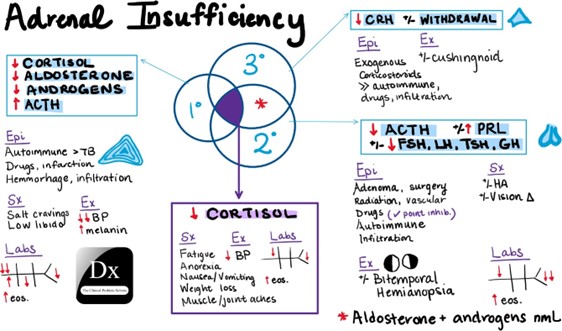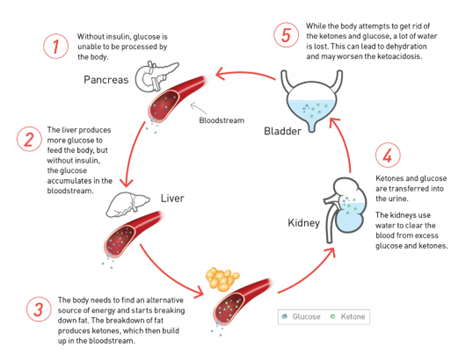A patient is being admited with a diagnosis of Cushing syndrome. Which findings will the nurse expect during the assessment?
Chronically low blood pressure
Bronzed appearance of the skin
Decreased axillary and pubic hair.
Pendulous Abdomen
The Correct Answer is D
Cushing syndrome is caused by excessive cortisol production by the adrenal glands, which can result in weight gain and redistribution of fat to the abdomen, giving it a characteristic rounded appearance.
The other options mentioned in the question are not typically associated with Cushing syndrome. Chronically low blood pressure is not typically seen in Cushing syndrome, as cortisol is a hormone that can raise blood pressure. A bronzed appearance of the skin is more commonly seen in conditions like Addison's disease, where there is a deficiency of cortisol. Decreased axillary and pubic hair is not a common finding in Cushing syndrome, although excessive hair growth (hirsutism) may occur due to the excess of androgens produced by the adrenal glands.

Nursing Test Bank
Naxlex Comprehensive Predictor Exams
Related Questions
Correct Answer is C
Explanation
The patient's vital signs suggest that she is experiencing hypotension, tachycardia, and possibly dehydration due to acute adrenal insufficiency. The highest priority nursing intervention for this patient is to provide isotonic fluids to restore intravascular volume and blood pressure. This will also help to correct any electrolyte imbalances that may be present. Administering furosemide (Lasix) or replacing potassium losses may be necessary interventions, but they are not the highest priority at this time. Restricting sodium would be contraindicated in this situation as the patient is hypotensive and needs fluids to increase intravascular volume.

Correct Answer is D
Explanation
Diabetic ketoacidosis (DKA) is a serious complication of diabetes that occurs when the body produces high levels of blood acids called ketones. The initial management of DKA involves fluid resuscitation with intravenous normal saline to correct dehydration and electrolyte imbalances. Therefore, starting an infusion of normal saline at 125 ml/hr is the first prescribed action the nurse should implement.
Bringing the patient a meal is not a priority at this time because the patient's blood glucose levels need to be stabilized before they can safely consume food. Administering Lantus insulin IV and giving sodium bicarbonate 50 mEq IV push are also not the first-line treatments for DKA. Lantus insulin is a long-acting insulin used to treat hyperglycemia over an extended period and should not be given intravenously. Sodium bicarbonate may be used to correct acidosis, but it is not the first priority in DKA management.

Whether you are a student looking to ace your exams or a practicing nurse seeking to enhance your expertise , our nursing education contents will empower you with the confidence and competence to make a difference in the lives of patients and become a respected leader in the healthcare field.
Visit Naxlex, invest in your future and unlock endless possibilities with our unparalleled nursing education contents today
Report Wrong Answer on the Current Question
Do you disagree with the answer? If yes, what is your expected answer? Explain.
Kindly be descriptive with the issue you are facing.
